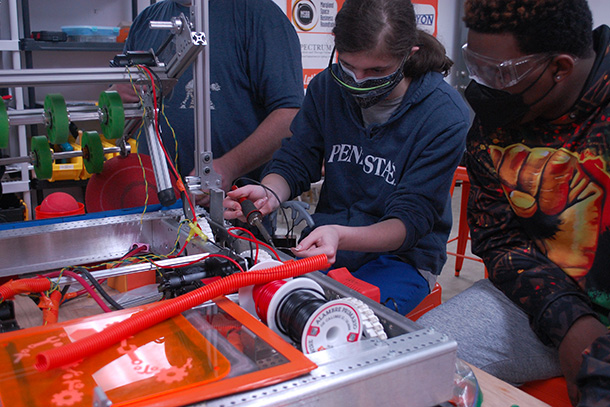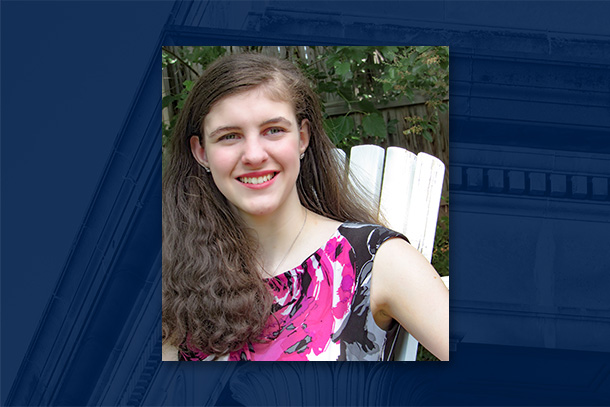
Madylene Triplett demonstrates how to solder for fellow members of her high school robotics team. Triplett, a former Penn State School of Electrical Engineering and Computer Science camper, is now a first-year Penn State engineering student. Credit: Provided by Madylene Triplett. All Rights Reserved.
Camp to campus: A first-year student’s path to engineering
Furby dissection leads to pursuit of engineering degree
October 12, 2022
By Sarah Small
UNIVERSITY PARK, Pa. — Madylene Triplett first stepped onto a Penn State campus when she was 13 to attend summer camps hosted by the Penn State School of Electrical Engineering and Computer Science. During the camps, she programmed robots, designed and built a vacuum and spoke with women engineers from NASA, Google and elsewhere. Now, she is on her way to becoming one of those engineers herself, as she steps back onto a Penn State campus, this time as a first-year student.
Triplett is continuing her engineering education in the Penn State 2+2 program. She’ll spend her first two years in the electrical engineering program Penn State Harrisburg and finish at Penn State University Park.
While her time in the School of EECS summer camps determined, in part, her plans to major in electrical engineering, her interest was first piqued by a broken Furby.
“When I was just starting middle school, I had a robotic Furby toy that broke,” she said. “My dad, who is a software engineer, took it apart but wasn’t able to fix it. I thought I’d try to fix it myself. I couldn’t, but just getting to see how all the parts of it worked and how it could do all of these movements by only using one motor to run. It was really fascinating to me.”
For Christmas that year, Triplett asked for a make-block robot kit, which she spent all day building and programing.
“It made me want to do even more with robotics,” she said.
Triplett and her parents began looking for camps but were unable to find any near their home in Maryland.
“Penn State seemed like kind of a pioneer in these types of camps,” she said, noting that a wider variety of camps are now offered by more universities. “I've always known that I could be an engineer if I wanted to, but a lot of women my age don't know that this is a possibility. I thought it was really awesome that Penn State was trying to get us into this, and it got me considering that maybe I’d want to one day go to Penn State for college.”
Starting with the first computer science and engineering camp in 2017, the School of EECS has hosted camps for middle and high schoolers of all identities, with a focus on engaging girls — who are underrepresented in STEM fields — in engineering. The school added the Anything is POssible for Girls in Electrical Engineering (APOGEE) camp the following year and has hosted two camps per year ever since — even virtually through the pandemic.

Madylene Triplett Credit: Provided by Madylene Triplett . All Rights Reserved.
“The engineering mindset, which is central to our tech-driven world, is about more than math and physics,” said Tim Kane, Penn State professor of electrical engineering and faculty lead of the APOGEE camp for all six years. “This way of thinking is really about creative problem solving, teamwork and making things for this world. As such, we need everyone at the table to help us build. The APOGEE camp was developed as a means to reach out to female and gender-diverse populations, foster them and fold them into the broader engineering tapestry.”
Triplett’s initial foray into engineering exemplifies Kane’s claim that engineering is about more than math and physics; she found herself interested not because of any particular schoolwork, but because of her broken Furby.
At the camps, Triplett completed a variety of hands-on projects, from programming choreography for a robot dance to making a vacuum out of two paper cups, a paint-stir stick, dryer sheets, a motor and a fan blade. Through the camps, she found that electrical engineering was the most appealing focus to her.
“The APOGEE camp really helped solidify that electrical engineering can be used for a wide range of things,” she said. “You could go into so many different fields as an electrical engineer, which is nice because there are times when I’m not 100% sure what I want to do. Knowing that my major could help me get into multiple types of work is great.”
Triplett continued studying the concepts and hands-on projects from the camps at home, developing a workshop on the building blocks of robotics for students in sixth through 12th grades. She earned her Girl Scout Gold Award for the efforts.
In 2021, her last year as a camp participant, Triplett discussed her desire to major in electrical engineering with Kane. According to Triplett, she wanted to attend Penn State, both because of its strong reputation and her positive experiences at University Park with the camps, but having been homeschooled, she was nervous about going from a class of one to such a large campus.
“Professor Kane told me about the 2+2 program, and he recommended starting at the Harrisburg campus for electrical engineering,” she said.
Kane said he’s looking forward to seeing what the former camper’s next chapter has in store.
“Madylene is a wonderful example of why we do outreach projects such as APOGEE,” Kane said. “Michelangelo once quipped, and I paraphrase here, that the statue was already waiting inside the block of granite; he just had to release it. Well, Madylene was already an engineer when she walked in the door at APOGEE. We just encouraged her and opened as many additional doors as we could. It’s up to her now, and I’m more than a bit excited to watch her thrive!”
It's a full-circle moment for Triplett, who has spent so much time learning from Penn State engineers at the camps and is now on her way to becoming one herself.
“I am excited to be a Penn State student and to hone my electrical engineering skills,” Triplett said.



